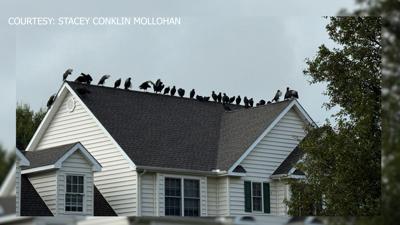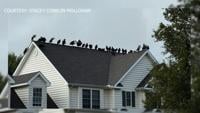KENT CO., DE- Kent County neighbors in the Derbywood neighborhood are ruffling feathers over an unwanted invasion of dozens of vultures, which have taken over rooftops, mailboxes, and streets, creating property damage and safety concerns.
Residents say the problem has been building for more than a decade. What started as one or two birds has grown into dozens, and neighbors believe a nearby resident is feeding the vultures, attracting them to the area.
Bernard Raines, a Derbywood neighbor, says the number of birds has steadily increased over the years and has recently reached unprecedented levels.
"Started with a few birds, and then it kept growing and growing. The other day I counted 45."
Gary Callaway, another Derbywood resident, says he believes a neighbor is feeding meat to the birds, keeping them in the area and making it impossible for people like himself to get rid of them.
"We basically think that that guy might be causing them to stay here in this area by feeding them and giving them what they like."
Callaway says he often spots more than a dozen vultures swarming his rooftop and his neighbors’ at once. He says the birds are more than a nuisance—they wreak havoc, forcing residents to shell out thousands in repairs as the vultures relentlessly tear at shingles while perching on homes.
"While they're hanging out there, they're tearing up shingles."
Callaway adds that the highly acidic bird droppings can damage roofs, pools, and other property, further increasing repair costs and frustration.
David Polanco, a Derbywood neighbor, says the problem isn’t just property damage. With vultures scattered across the neighborhood, he worries about his grandchildren’s safety when they play outside.
"They don't just stay on the roofs. They come down to the lawns. So it's a concern for safety."
WBOC contacted the Department of Natural Resources and Environmental Control, which confirmed that a Derbywood neighbor had called its Wildlife Section about the vultures. DNREC said it referred the caller to the USDA, which has handled similar complaints in the past. However, due to the government shutdown, WBOC was unable to reach the USDA.
The Department of Natural Resources and Environmental Control notes that vultures are federally protected under the Migratory Bird Treaty Act, and removal requires federal permits, which are granted only in extreme cases.
Raines says he feels frustrated that nothing can be done to remove the birds.
"It's not our problem. We're not the ones who say protect the things. If they want the birds protected, protect them."
Polanco echoed the sentiment, saying the lack of action has left neighbors feeling helpless.
"You reach out to agencies you think will help you, and when you get nothing, it's frustrating."
Polanco says the lack of solutions has forced him to devise his own methods for chasing the birds away, but they always return within hours.
"I use a drone to chase them off."
Raines says he has considered other options but has found none practical.
"I've thought about running barbed wire up there, but that would tear it up worse."
Polanco says the neighborhood can’t wait any longer for a solution to protect homes and safety.
"Soon they'll be on every house. And that's what we're trying to prevent."
Although vultures are federally protected, the Department of Natural Resources and Environmental Control says there are legal ways to deter them. The agency recommends installing a grid of monofilament on rooftops to prevent perching. Other deterrents include reflective tape, hanging CDs, scare balloons, or eagle decoys—all designed to discourage vultures from roosting nearby.
Derbywood neighbors tell WBOC they plan to hold a community meeting next week to bring residents together to discuss potential next steps and solutions.


